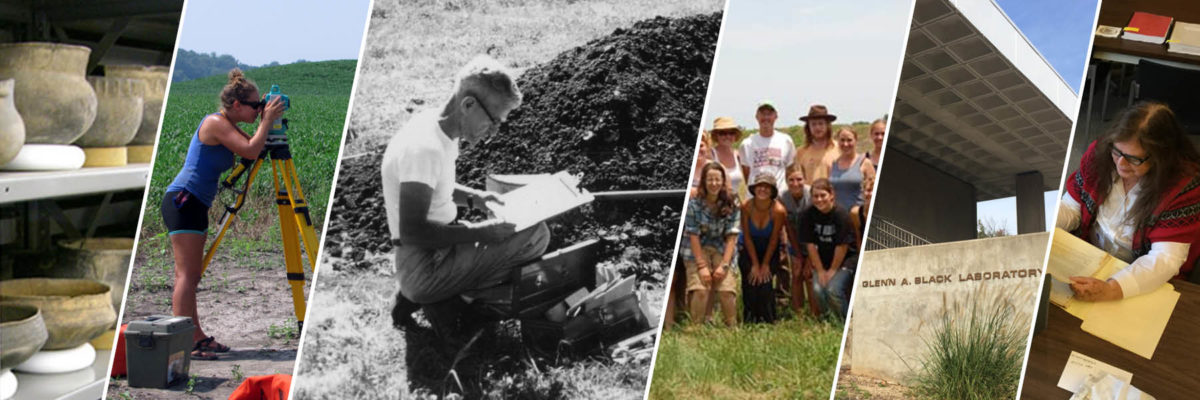February 1, 2017
by Hannah Rea, Social Media Intern
In honor of Black History Month, let’s take a look at a few African American archaeologists and anthropologists who have enriched the field of archaeology:
John Wesley Gilbert
Gilbert is generally regarded as the first trained African American archaeologist. Born in Georgia in either 1864 or ’65 (sources dispute his birthdate), Gilbert faced poverty and discrimination throughout his life. He earned his B.A. in ancient Greek from Brown University, and in 1888 was appointed to Paine College in Augusta, becoming the first Black faculty member. The first African American to work in classical archaeology, he helped excavate Eretria on the island of Euboea, and the map he created of the site was later published. In the early 1910s, Gilbert accompanied a Methodist mission trip to Africa with his friend Walter Russell Lambuth. Utilizing his language skills to aid communication, and religion to overcome racial divides, the trip was viewed by many as a success; in 1968, the Gilbert-Lambuth Memorial Chapel was built on Paine College’s campus to celebrate the two men.
Theresa A. Singleton
Currently an associate professor of anthropology at the Maxwell School of Syracuse University, Singleton was the first Black woman to earn a Ph.D. in historical archaeology and African-American history and culture from the University of Florida. According to her biography in Syracuse’s faculty listing, she specializes in historical archaeology, African-American history and culture, slavery in plantation America and archaeology of the African Diaspora. She started studying slavery on the coast of Georgia, looking into the Gullah-Geechee, a group of people who were descended from slaves and were named for a variation of creole. She published several books on African-American life in America, and is currently studying the history of slavery on coffee plantations in Cuba.
Alexandra Jones
Jones is the Founder and CEO of Archaeology in the Community, a nonprofit organization that works to teach people of all ages about archaeology and history. She has B.A.’s in history and anthropology, as well as a Master’s in history from Howard University, and a Ph.D. in history from the University of California, Berkeley. According to her biography on the AITC site, Jones has taught in primary schools, museums, colleges and camps, and, in 2013, worked as the Archaeology Field School Director for PBS’s “Time Team America.”
Whitney Battle-Baptiste
Battle-Baptiste is an associate professor of anthropology at University of Massachusetts at Amherst, and specializes in the crossing of race, class and gender as it relates to the African Diaspora. She graduated with a bachelor’s in history and secondary education from Virginia State University and a master’s in history from the College of William & Mary, as well as a Ph.D. from the University of Texas at Austin in anthropology. In 2015, Battle-Baptiste was named director of the W.E.B. Du Bois Center at the UMass Amherst Libraries, which works to educate on and lead discussions about issues relating to race, labor and social justice across the world. She has worked on historic sites from the W.E.B. Du Bois Homesite in Massachusetts to the home of Andrew Jackson in Nashville, and has published a book on Black feminism as it relates to archaeology.
Michael Blakey
Blakey is a National Endowment for the Humanities professor at the College of William & Mary, and has a B.A. in anthropology from Howard University, and a M.A. and Ph.D. in anthropology from the University of Massachusetts at Amherst. According to his faculty listing, his specializations are in biological anthropology, biohistory, skeletal biology and the African Diaspora. He rose to prominence in the 1990s during the controversy surrounding the excavation of a building site, now known as the African Burial Ground National Monument: though the site was listed on maps as a burial ground for slaves in the 1700s, a previous archaeological survey had determined it was unlikely remains would be found, due to centuries of urban development. Upon digging, intact burials were found and the African-American community in New York City was angered that they were not consulted, and worried the remains would be destroyed or otherwise disrespected. The site was turned over to Blakey and a team of archaeologists and anthropologists at Howard University, whose efforts in studying the remains gained media exposure and helped the site be registered on the National Register of Historic Places in 1992.
References:
“Field School Director: Dr. Alexandra Jones.” Pbs.org. Oregon Public Broadcasting, 2014, http://www.pbs.org/time-team/meet-the-team/alexandra-jones/.
Fitzgibbons, Daniel J. “Battle-Baptiste Named New Director of W.E.B. Du Bois Center at UMass Amherst.” Umass.edu. University of Massachusetts Amherst, 26 Jan. 2015, https://www.umass.edu/newsoffice/article/battle-baptiste-named-new-director-web-du.
“Michael Blakey, National Endowment for the Humanities Professor.” Wm.edu. William & Mary, 2017, http://www.wm.edu/as/anthropology/faculty/blakey_m.php.
Ronnick, Michele Valerie. “Gilbert, John Wesley.” African American National Biography, 2006. Oxford African American Studies Center, doi: 10.1093/aasc/9780195301731.013.1474.
“Theresa Singleton, Associate Professor, Anthropology.” Maxwell.syr.edu. Maxwell School of Syracuse University, n.d., https://www.maxwell.syr.edu/anthro/Singleton,_Theresa/.

